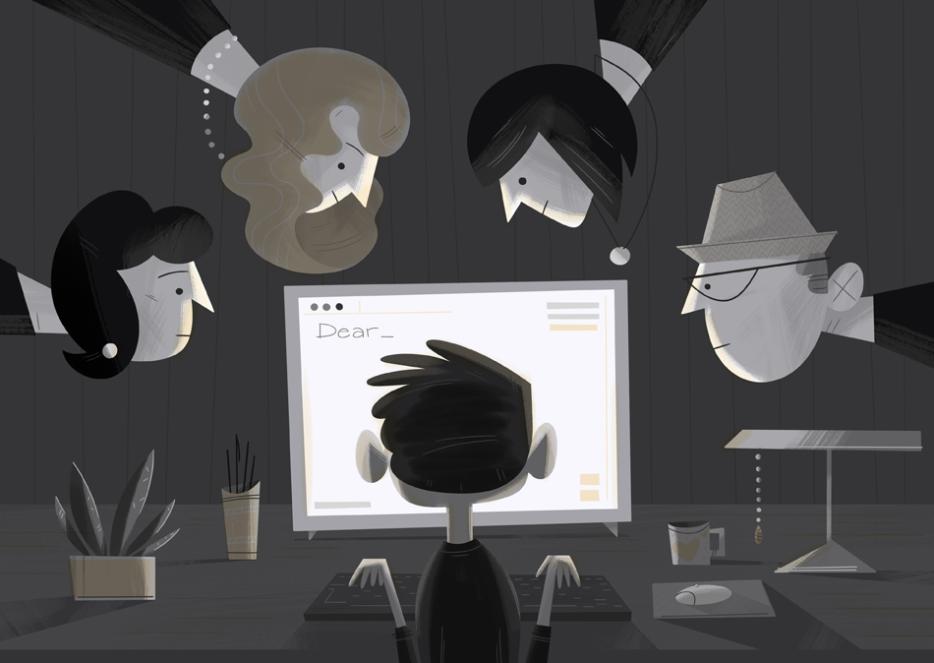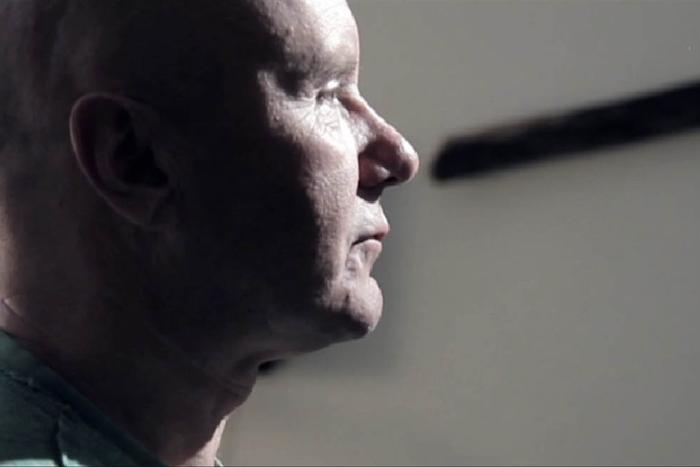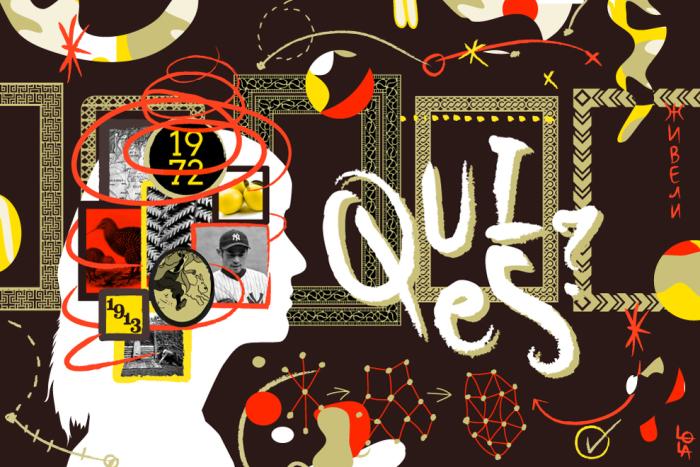In the late 17th century, a “panel of experts” answered reader queries submitted to the The Athenian Mercury, on topics ranging from literature to epistemology; the magazine’s spin-off, The Ladies Mercury, was devoted solely to advising “virgins, wives, or widows.” A hundred years later, the Ladies Monthly Museum, a periodical devoted to the “Amusement and Instruction” of polite females, would provide what’s probably the template for the contemporary advice column. Since then, “agony aunts” (and “uncles”) have become staples across media—print (Ann Landers, Dear Abby, Dan Savage), radio (Dr. Drew), online (Cary Tennis)—and the most distinctive voices among them have become iconic.
But why do complete strangers seek advice from people they hardly know? And likewise, how do advice columnists—who are rarely psychologists or ethicists by training—justify their answers?
Hazlitt recently gathered four of our favourite columnists for a round of shoptalk on the ethics and challenges of the advice game. Cheryl Strayed, otherwise known as ‘Dear Sugar’ at The Rumpus, has published two books this year: the New York Times bestseller Wild, a heartrending memoir about her arduous solo trek along the Pacific Crest Trail in the wake of a marriage break-up and her mother’s death; and a collection of her ‘Dear Sugar’ columns titled Tiny Beautiful Things. Cary Tennis writes the ‘Since You Asked’ column at Salon, where his existential musings have offered comfort to readers since 2001. Emily Yoffe is Slate’s ‘Dear Prudence’, while her other writing has appeared in the New York Times and Esquire. Lynn Coady is a former advice columnist for The Globe and Mail and her novel, The Antagonist, was shortlisted for the 2011 Giller Prize.
Are there common threads or themes that you see over and over in the questions you get? Questions that seem to be real problems in a lot of people’s lives that they keep writing in about in variations?
Cheryl: Yes, a ton. There are a lot of people with broken hearts. And they’ll never get over so and so leaving them.
Emily: Yeah, I never run those because the answer is the same and it’s very boring. It’s just, “Move forward.” The guy I thought I’d kill myself over when I was 27 I can’t remember the name of now. There are some big general categories. One is cubicle land. The horrors of the farters, the breathers, the hummers, the eaters. I can only do a limited number of “My husband looks at porn.”
Lynn: With 'Group Therapy,' because of the nature of the column, I got a lot of emotional etiquette questions. It had a jury effect. A lot of people wrote in about some relationship they had, and both parties were hurt and insulted by something the other had done, and the over arching question was “Which one of us is the asshole here?”
Emily: Another thing I’ve learned from the column is write the damn thank you note! This feeling of “I haven’t been sufficiently acknowledged” is really deep. Read the Bible. Cain and Abel. What was that over? God liked this gift better than that gift. They seem trivial, but they’re big.
Cheryl: That’s funny. I hardly get etiquette or work-related stuff. I get a lot of sex and love questions. There are far more 28-year-old virgins out there then I ever would have imagined.
Emily: Don’t you want to put them together?
Cheryl: Introduce them to each other? Yeah. There are several questions from virgins that stump us. I’ve gotten questions from virgins that ask, “How do you get to the point where you have sex with someone else?” I don’t know how to explain that. I always had the opposite problem, like how do you get to a place where you don’t have sex with someone?It’s funny.
Emily: I agree. There’s something heartbreaking about that. I get a lot of “I’m 25, 27, 28. Everyone says I’m attractive. I have a good job, but no one from the opposite sex has ever touched me.” And you wonder. There are some people who miss the boat in high school and they think there’s some kind of magical thing that happened that they missed. And they get older and older and they’re heading toward becoming a 40-year-old virgin.
Cheryl: Well maybe that’s a part of it. They missed that moment where they were supposed to do that thing. And then now they’re on the other side of it and it becomes an issue. Cary, how have you answered this?
Cary: The introversion/extroversion thing is hard sometimes. Some people are deeply introverted and it’s hard to fathom. As my detractors will be happy to note, I don’t always provide answers. Sometimes I’m just writing a thing. I answer a lot of questions that are unanswerable, because I’m not really answering them. I’m like singing a song. I’m trying to say something comforting.
Emily: I think Cary gets to the heart of what makes each of our columns different. What you describe is very different from what I do. I’ve had people say, “I don’t know how you answered that.” I say I only answer the ones I think I can answer! People are looking at these columns for different things.
Cheryl: Cary and I go off and do the literary thing. I had never read Cary’s column before I started to write mine. So I went and gobbled them up when I started. We do our own thing, but it’s in the same vein. We rely on a certain kind of storytelling and forays even into aspects of memoir where we tell stories from our lives by way of giving advice.
How did you all get into the advice game? Was it something that dropped in your lap? Or was something you pursued?
Emily: I didn’t set out to be an advice columnist. I got the job because I was at Slate. I have no particular qualifications for it. I took some psychology classes in college but I’m not a trained therapist. I’m the third Dear Prudence. The first was a man named Herb Stein, who was the head of Nixon’s council of economics advisors. The second one was Margo Howard who is the daughter of Ann Landers.
Lynn: It dropped in my lap pretty much. I was between novels and the person who had done the 'Group Therapy' column before me was a writer. Like Emily, I have no qualifications whatsoever except for being a novelist. This turned out to be a really great qualification for writing an advice column because you spend all your time thinking about human dilemmas and human psychology and why people do the things they do and make the mistakes they makes. So I felt uniquely qualified from the get go.
Cheryl: I had no intention of writing an advice column and I didn’t know anything about writing advice columns. The writer Steve Almond wrote the 'Dear Sugar' column for The Rumpus before I did. He was going to end the column but he thought about asking me instead. Pretty immediately I wondered why I’d said yes because I didn’t know anything about advice columns. So I really just found my way down the path as I went.
Cary: Can I ask about that WTF column, was that the very first?
Cheryl: No, that column was about two months into it. What happened was I really just decided I would use what I had available to me. So, everything I knew as a writer of fiction and memoir and then to weave those elements into giving advice. What about you Cary?
Cary: I working at the Salon copy desk and I’d written some articles for them but mostly I was the copy chief. I was editing Garrison Keillor’s column called Mr. Blue, which was his advice column and it was the first column I’d ever seen that was written with a literary tone. Then he left Salon and they launched a search. I had never thought of being an advice writer but I offered to do it for it for a little while. I had Garrison Keillor’s voice in my head from copy editing it so much and I had my experience from alcoholism recovery in just listening to people’s stories and being able to hear them and respond back in a humble way. I came cheap because I was already there.
How do you feel about the ethics of advice giving, considering that none of you come equipped with a background in psychology or therapy. Do you acknowledge that in your writing?
Emily: People are writing to an online advice columnist. They know what to expect. They know I might not take their side. My obligation is to take the letter seriously but also to write an entertaining column. I think if you’re sending in this letter you know who you’re sending it to. You know my voice.
Cheryl: I agree with what Emily said, people know who they’re writing to. That said, I’ll still say “hey you would benefit from seeing a doctor or a therapist and working out these issues beyond what we’re able to do here in a single exchange in a public forum.” Initially, I thought who am I to tell people what to do? Then I realized I wasn’t telling people what to do from the perspective that this is the only opinion and my opinion is the one that matters. I try to write with a sense of awareness and humility. A lot of times my answers aren’t “go do this” or “go do that.” They’re really trying to deepen the question, ask bigger questions to invite a more meaningful examination of the issues. That’s how I’ve kind of dealt with the weight of that responsibility.
Lynn: I’m kind of jealous of you guys, because you have so much space to work with. I was given 350 words to start at The Globe and Mail and that gradually got shorter and that’s why I decided not to write the column anymore. At a certain point you can only give a thumbs up or a thumbs down. I would try to be anecdotal, which was my way of weaseling out of the idea that I was some sort of moral authority. I would always try to rhetorically couch my response with “here’s what I think and I’m just some lady writing for the newspaper,” but also with the understanding that Emily mentioned that they’ve agreed to send their problem into the newspaper for the public’s delectation.
Still, people are sending in these intensely personal questions to you and I imagine it must be a daunting task to address them.
Cary: It can be soul crushing just to confront some of these.
Emily: When I go on vacation and I come back and I have 100 letters in my inbox, the amount of human misery, your heart breaks. Most of those kinds of letters I don’t even use. They’re people whose lives are in meltdown and they need social services. Why do people write to us and not see a therapist? I think seeing a therapist is a daunting, expensive, confusing thing for a lot of people and the other thing is if you go to a therapist you might not want someone to say, “Well, how did you get here?” You want someone who’s not a family member, not a friend, who’ll give a short sharp answer.
Cheryl: That’s right. I have the same experience when I’m looking for the next question to answer, that’s when I feel overwhelmed. There are so many people that are seeking help. They’ve identified with the advice givers ability to effect transformation. I always feel like I genuinely want to help people and that’s been the huge reward of being 'Dear Sugar.' I do think that my writing has helped people. But then there’s this sense that you need to help everyone and you can’t do that.
How does your personal emotional experience influence the way you answer questions?
Lynn: There were definitely questions I felt more comfortable answering and that I bring legitimate authority to my response. I really liked answering the questions of young women who were just out on the dating scene and having these Sex and the City-type experiences. It was great just to play the bitchy big sister and say, “You don’t have to put up with that.” And to play with that with the complete authority of my many years. But there are questions where I felt I had to somewhat fake it. I also got a lot of wedding etiquette questions. They would just infuriate me. It seems that when people get married they have this idea that everyone who’s invited to the wedding has to obey these sets of rules and if people don’t line up and do it, it becomes the “Who’s the asshole?” question. Usually I side with the people who forgot the gift or who forgot to behave in a certain mater. So, those are the questions where I had to muster up sympathy.
Emily: I like to draw on my own experience, and obviously it will colour what we do. I actually spend too much time personally answering questions from people dealing with crappy childhoods or mentally ill parents. If I get those letters I’ll always write something back to them personally.
Cary: Oh wow, do you do that a lot?
Emily: Just for certain kinds of letters. Because I know I’m not going to use it in the column.
Cheryl: And why wouldn’t you use it in the column?
Emily: There are just too many on the same theme. But I also really enjoy getting the letter that’s completely outside my experience. I had a letter a while ago from an identical twin that had been in a long-term incestuous relationship with his twin brother. The question was not “Are we doing right or wrong?” but he wanted to keep it quiet from the family and the other brother wanted to out them as a couple. Dan Savage was so pissed off that this guy wrote to me and not to him! So it was very amusing for me.
Cheryl: I would be quite daunted by the twin-cest question. The questions that are a little closer to my experience I think I can answer from the gut. I do think that there are some issues that I’m more drawn too. But I’m also mindful of keeping the column diverse. From the beginning I wanted it to be not just a sex and relationships column. I wanted to be able to write about money and loss and parenting. I wanted the column to reflect the human experience.
Cary: I came to the column as someone whose primary experience with troubled people was in the realm of addiction and recovery and 12 steps. In that arena we share our experiences, strength and hope. We pretty much stick to our own experiences. That’s the nugget on how the 12-step thing happens, so that’s a good grounding. Also, you learn so much by doing the research on the questions. It’s fascinating. You’re learning fast, so you can get called out. Lawyers are very touchy. They’ll remind you you’re not a lawyer and they seem to love that. So I always remind people in advance I’m not a lawyer, I’m not a therapist, I’m not a doctor, I don’t have a psychological degree.
Cheryl: But the thing about not having a psychology degree. For writers, psychology is really our expertise. And I realize it’s in a different way than actual psychologists are. The deal is that we have to understand the human condition. We have to understand what motivates us, what we desire, what we reveal and conceal. All of the grand things, the grand passions and failings, all of those dynamics we need to know about. I’ve drawn on those things when I’ve thought about giving advice. Some people write us letters and they don’t always tell us the whole story, so we have to imagine.
Lynn: I think the key is sympathy and empathy. Those are the tools you need to write convincing fiction. You need to be able to see a scenario from every side. So even if you have your characters that are your protagonists or villains, you still have to see the story from that person’s point of view and how they would justify their bad behavior.
What do you read when you’re looking for advice or comfort? Do novels or poetry offer any kind of guidance?
Lynn: I like Kurt Vonnegut, actually. Someone recently started a Twitter account under his name, and they tweet his pithiest lines. They’ re little nuggets of profundity. And his novels are full of those. I think he would have made a great advice columnist because he knew his mind and he had a really solid sense of the world. He had every reason to give up on human beings and he never did. So whenever I’m feeling down on the world, I like to pick up a Kurt Vonnegut novel or essay.
Cheryl: I turn to literature as well. The great writers have offered me the greatest consolation. The stories of Alice Munro, Raymond Carver, Adrienne Rich, any number of books that I’ve read over the years that have really comforted me in my sorrows and also expanded the view. When I do use stories from my life in the column, that’s what I’m trying to offer. I’m not trying to say, “Let’s talk about me.” I’m trying to use a story as a way to expand on the letter writer’s situation. Reading is in some ways my religion. That’s my great solace.
Emily: I like what Cheryl said. I like to find literary references for the letter writer as well. I’ve cited Alice Munro. Fairytales sometimes seem appropriate when I’m answering letters as an archetypal thing. For my own personal problems, I turn to people in my life for their advice. My sister and I are very close. She’ll often say, “Well what would Prudie say?” I say I already know what she’d say, I want to know what you think. I turn to the people that I trust.
Cary: For consolation in my life I turn to art: poetry, music, fiction. I think for solving practical problems I just tend to go do the research. Like, “Let’s read about depression,” and get the information.
Emily: The pleasure of this conversation is these four very different people, doing the same job in their own very unique way. Which speaks to why people enjoy the form and come to it for different reasons. Although you might get a better insight from a therapist, I think the pleasure that people get from a well-crafted answer, that doesn’t just deal with the question but gives you pleasure to read. That’s the reason that we all enjoy this medium.






